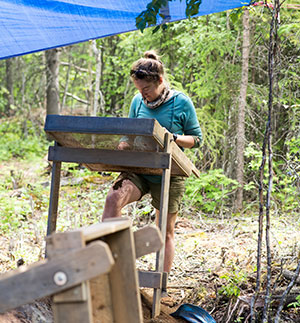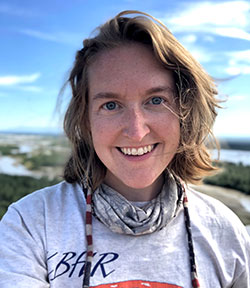
Contact Us
Institutional Communications
Bureau of Mines Building, Room 137
Laramie, WY 82071
Phone: (307) 766-2929
Email: cbaldwin@uwyo.edu
UW’s Doering Receives Rare Archaeological NSF CAREER Grant
Published July 21, 2023

Bree Doering, a University of Wyoming Department of Anthropology assistant professor,
screens for artifacts at a site in central Alaska. Doering recently received a five-year
National Science Foundation CAREER award, making her the first UW anthropologist to
receive the grant that is intended to support early-career faculty members’ research.
(Whitney McLaren Photo)
Bree Doering is still processing the news that she is the first University of Wyoming anthropologist to receive one of the most prestigious National Science Foundation (NSF) grants.
Doering, a UW Department of Anthropology assistant professor since 2020, recently received a five-year, $699,550 NSF CAREER award for her current research project titled “Reconstructing Subsistence, Diet Breadth and Paleoclimate in Interior Alaska during Social and Climatic Transitions.”
The Faculty Early Career Development (CAREER) Program offers one of the NSF’s most prestigious awards to support early-career faculty members who have the potential to serve as academic role models in research and education and to lead advances in the missions of their departments or organizations.
Unlike most NSF grants, the award has only one principal investigator and highlights the promise of early-career scholarship. Very few archaeologists have ever received the prestigious award, and Doering is the first UW anthropology researcher to receive the honor.
“It feels gratifying and unbelievable. I talked of applying for this grant when I interviewed for my position, and I never thought that I would succeed because it is so selective,” Doering says. “My colleagues in the UW anthropology department were very supportive, read drafts and provided advice. I know their encouragement certainly contributed to my success. I also am very excited to continue to do research where I grew up in and around Fairbanks, Alaska. It feels great to bring this award ‘home.’”
Doering’s project focuses on what people ate in interior Alaska through time, noting that most archaeologists assume that fish were not eaten very often until quite recently, perhaps even after the arrival of Europeans 125 years ago.
“This contradicts what local Indigenous communities say about their history in the region. To them, fish and other small game, such as birds, have always been very important,” she says. “Archaeologists might be missing these smaller remains for many reasons.”
Professor Melissa Murphy, chair of the UW Department of Anthropology, says she is delighted that Doering is being recognized for her leadership in her cutting-edge and collaborative archaeological research.
“To receive an NSF CAREER grant in any field or discipline is extremely competitive, but to receive an NSF CAREER grant as an archaeologist or anthropologist is nigh impossible,” Murphy says. “None of us in anthropology are surprised that Doering landed this grant because she is such an exemplary early-career scholar, a dynamic teacher and a dedicated mentor and adviser to our students. We are so fortunate to have her among our faculty, and she continues the strong research tradition in our department.”

Bree Doering
In her project, Doering will use a sophisticated chemical sampling technique to identify fish and birds directly in the remains of ancient cooking pits, where she will essentially sample the ashy dirt associated with old fireplaces and take the grease out to identify by isotopic chemistry. She will work with local communities to better understand different cooking traditions and use that information to analyze the results.
“This project is unique because I will look at archaeological material that has been sampled over the past decades, gather more material from important sites, and use Indigenous knowledge and partnership to interpret the results,” she says.
Doering, whose UW teaching specialty is human-environment interactions in such courses as zooarchaeology, will collaborate with the Healy Lake and Nenana villages on the project. Each year of the research, Doering will use funding for one or more graduate student positions.
“I have funding to bring my results to local fish camps and do what is called experimental archaeology with Alaska Native youth in local villages,” she says. “I also will hire a postdoctoral scholar who specializes in ancient plant identification to look at the burned plant remains from cooking features. They will be able to identify the trees, berries and other plants cooked in these ancient fires.”
Doering then will complete excavations at two sites over three summers of fieldwork with a team of UW and Alaska Native students. One of these sites, Swan Point, is broadly recognized as the earliest residential camp in the Americas. The other site, Niidhaayh’ Na, is a remote site that is only accessible by helicopter.
“The project will provide paid hands-on scientific opportunities for Alaska Native youth and applied training to dozens of University of Wyoming students inside and beyond the classroom,” Doering says. “Ultimately, this research will explore one way that Western theory and Indigenous ways of knowing might be meaningfully integrated in our understanding of past environments.”
The research and educational outcomes are designed to provide tangible societal benefits that will improve scientific outreach and generate communicative products through dedicated mentorship, she adds.
“There is so much to highlight about Bree’s research,” Murphy says. “She is using archaeological methods and data to help address present-day challenges, and she is collaborating with descendant communities in Alaska in the execution and interpretation. Her grant also will provide invaluable field and laboratory scientific research opportunities for Alaska Native youth and our students for the next five years.”
Doering received a B.A. (2012) from Barnard College in New York City; and both her M.A. (2016) and Ph.D. (2020) from the University of Michigan.
Contact Us
Institutional Communications
Bureau of Mines Building, Room 137
Laramie, WY 82071
Phone: (307) 766-2929
Email: cbaldwin@uwyo.edu
